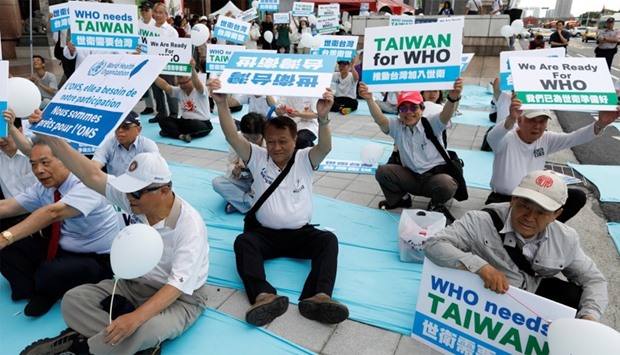Taiwan voiced deep disappointment Sunday at its exclusion from a major World Health Organization meeting, and urged international pressure on rival China to ensure it has access in future.
The WHO's main annual meeting, the World Health Assembly (WHA), kicks off in Geneva on Monday, but for the first time in eight years, Taiwan will not be granted access.
‘We feel very, very disappointed,’ Taiwanese Health Minister Chen Shih-chung told AFP in Geneva on Sunday.
Self-governing Taiwan, which China sees as a renegade province awaiting reunification, has been invited to attend the WHO's main annual meeting as an observer every year since 2009, but this year it did not receive an invitation.
Relations with China have become increasingly frosty since Beijing-sceptic President Tsai Ing-wen took power almost a year ago and China has sought to block the island from a string of international events.
‘Each year since 2009, a cross-strait understanding has been the foundation for a special arrangement for Chinese Taipei to participate as an observer in the World Health Assembly,’ WHO's head of governing bodies and external relations, Timothy Armstrong, told reporters earlier this month.
‘Unfortunately this year, no such cross-strait understanding exists, so there is no basis for the invitation.’
As a result, Chen will not even be able to access the UN's European headquarters in Geneva, where the WHA will take place through May 31.
Taiwanese media have also been refused access to cover the event.
- Permanent observer? -
But Chen told AFP he had travelled to the Swiss city anyway to meet health ministers and diplomats from more than 30 countries on the sidelines of the meeting.
‘We want every assistance to keep up the international pressure so that this condition will not be happening again,’ Chen said, refusing to say which country representatives he would be meeting.
Taiwan was expelled from the WHO in 1972, a year after losing the ‘China’ seat at the United Nations to Beijing.
With China in the ascendant, Taiwan has shed global allies in recent decades and only 21 countries now recognise the island's sovereignty.
Even its most powerful ally, the United States, has no official diplomatic relations with Taipei.
US President Donald Trump recently rebuffed the idea of another phone call with Tsai after their protocol-busting chat following his election victory, saying he would not want to damage relations with China's President Xi Jinping.
Around a dozen representatives from countries that back Taiwan are expected to push Monday for the island to receive permanent observer status at the WHO, although there is little hope the request will be granted.
‘Obtaining a permanent observer (seat) is our final goal,’ Chen said, acknowledging though that this was not likely to happen overnight.
‘We will do it step by step,’ he said.
Chen said there were no plans to meet with Chinese officials during his trip to Geneva, but said that ‘for the health of both sides we are willing to work together if we have the chance’.
He warned that leaving Taiwan out in the cold could be detrimental to global health, with international cooperation and rapid exchange of information seen as vital to halting disease outbreaks.
‘We feel sorry that the welfare of human health is unnecessarily polluted by China,’ he said.

